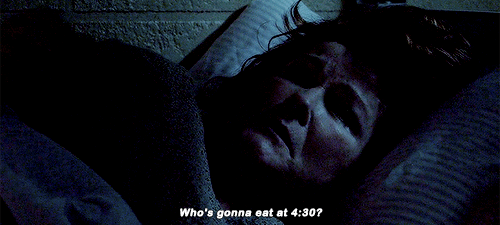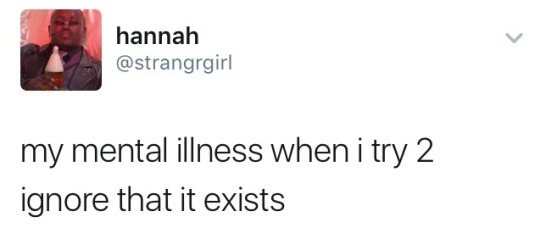Text
That dissociative feeling when...
Someone says “What did you say?” but you didn’t even realize you had said anything because you were 3 planets away.

4K notes
·
View notes
Text
A few of the mods of this blog have been talking, and we’ve been becoming increasingly concerned about a trend that we’ve all noticed in the DID community here. We’ve tried to address it in the past, but we feel that it’s important that we try again and acknowledge that it’s much bigger than we communicated before.
What systems need to understand is that it isn’t healthy for anyone to allow their life to revolve around or significantly focus on their alters and / or inner world. It’s one thing to work extensively with alters in order to try to stabilize and heal. Similarly, if a small group of alters works together to manage daily life, of course this requires some degree of internal interaction. What concerns us is seeing that many people in this community act like internal happenings are just as or more important than external events and responsibilities, like internal relationships are just as or more important than external relationships, or like having DID is one of the most important things about someone.
It’s important to get along with your alters. It’s important for every alter to feel respected and heard. It’s important for alters to feel safe and content because your alters are part of you (or, to be more accurate, your alters and you are part of the same overarching system). Your alters need to be doing well for you as a whole to be doing well. Their physical, emotional, and intellectual needs are no less or more important than yours or any other alters’.
What isn’t healthy is focusing on alters’ surface needs at the expense of working on what the system as a whole needs. For example, while child alters can feel more safe and accepted when they’re given toys and allowed to play, it’s the safety and acceptance that they really need. Giving child alters safe play time can help them to reach a realization of safety, but the toys and play time alone aren’t sufficient. Child alters aren’t literal kids that you’ve been tasked with babysitting. They, like every other part of you, were created and shaped by trauma, and they aren’t uniquely immune to its effects. What they need most is for you as a system to heal.
You may not be ready to face your trauma now. Instead, you can start with making sure that your external environment is safe. You can work on symptoms of other mental health conditions that you have. You can find and practice healthier coping mechanisms. You can learn what healthy relationships look like. You can learn to ground yourself when you’re dissociated and even to prevent yourself from dissociating. What you cannot and should not try to do is focus on exploring your system and alters indefinitely at the expense of working towards actual progress. Learning that your child alters feel safer when they have a stuffed animal to hug can be a great realization! Spending days, weeks, months, or longer trying to learn all of your alters unique preferences, however, is a distraction.
It is not healthy to focus on alters’ desires at the expense of external life. While giving alters time to do what they enjoy can help the system to internalize that every part matters, this shouldn’t interfere with academics, your job, or your goals in life. Just as self care is important, giving alters some time to themselves can make for a more stable and happier system. However, just as self care shouldn’t become an excuse to never try to get anything done, making your alters happy shouldn’t become the same. Alters documenting their existence on Tumblr isn’t more worthwhile than meeting up with friends, going somewhere fun, or learning a new skill. Giving alters time out isn’t a more pressing issue than getting your homework done, making sure that you understand what you need to do for your job, volunteering, working on a personal project, or doing something else meaningful or fulfilling.
Similarly, relationships with alters should not take precedent over external relationships. While, again, it’s important for all alters to get along, you shouldn’t prioritize alters dating each other or being friends with each other over looking for, forming, and supporting external friendships, romantic and / or sexual relationships, and general connections. Keeping to yourself because you have your alters for company is not the same as meeting someone new or reaching out to old acquaintances. External loved ones can introduce you to new ideas, teach you new things, support you through hard times, and help you to grow as a person in ways that alters, as part of you, can’t. External loved ones should never make you feel bad about having alters or try to turn any of your alters against each other, but you in turn should try not to neglect them in favor of focusing on symbolic relationships between your alters.
What happens in your internal world will never be a good replacement for external life. Focusing on the jobs that alters have can never be as fulfilling as succeeding academically or in a job of your own. Internal families, partnerships, and friends can never be as fulfilling as finding or making your own family, partner(s), and friends. It may be difficult for you to achieve what you want to externally right now, and that’s okay! If spending time thinking about your internal world helps you to feel calmer, more confident, or more prepared to deal with your actual life, that can be okay. However, you need to be very careful that your internal world doesn’t become a crutch. Remember, distraction can be a coping mechanism, but if taken too far, it’s just another pathological response that’s standing between you and healing.
Another concern is that by focusing too much on your alters and how they feel like separate individuals, you can lose sight of how you all fit together. It can be harder to heal from trauma if you can’t acknowledge that it happened to you, all of you, and not just to specific alters. It can be harder to learn to handle triggers, face your fears, or respond appropriately to other intense situations and emotions if you always lean on specific alters to do so. It can be harder to rely on your abilities if you believe that only specific alters can accomplish your goals. It can be harder to really grasp and work towards your potential if you never acknowledge that your alters’ strengths belong to the system as a whole even if you can’t all access those strengths evenly right now.
There’s also the risk of getting so caught up in alters’ presentations that you give them more weight than the system’s reality. For example, an alter’s age cannot determine what age individuals the system should be with; an alter that presents as a minor in an adult system cannot be romantically or sexually involved with actual minors, just as an alter that presents as an adult in an underage system cannot be romantically or sexually involved with actual adults. An alter presenting as a certain race or ethnicity does not truly understand what it’s like to actually be a member of that racial or ethnic group. An alter presenting as disabled or with conversion disorder does not truly understand what it’s like to actually be permanently disabled in that way. An alter being a doctor or therapist internally does not give the system the medical or professional knowledge and experience of a doctor or therapist. Alters’ internal realities are never as concrete as external reality.
Finally, there’s all of the issues inherent in making a disorder a key part of your identity. Remember that you as a person have so much more going for you than what internal world jobs or abilities your alters have. You’re worth so much more than a list of alter names and associated traits. There’s so much more that’s interesting about you than that you have DID, how many alters that you have, or how your alters present. Some people might struggle with internalizing this, and that’s okay. Even if you’re one of those people, working towards understanding yourself as a whole is worthwhile. Like everything else here, it may take time, effort, and a large change in how you view and understand your system and DID as a whole, but it’s so much healthier in the long run, and every little bit of progress counts.
To reiterate and to make sure that this is absolutely clear, working with your alters is important for healing! It’s okay to acknowledge that your alters can be different from you in important ways. It’s okay for alters to want to spend time doing things that they enjoy, working towards their own interests and passions, or forming their own relationships. It’s okay to not be sure yet what your system’s overall goals, talents, or traits are. It’s okay for several alters to be important parts of your daily life and to have no intention of changing that. Where the line needs to be drawn is allowing your DID, your mental illness, to overshadow your external life. While it may feel comforting now, it’s overall limiting, and you deserve better than that.
-Katherine of Those Interrupted
(Note: I used “DID” throughout this post because OSDD-1 systems don’t seem to have this problem as often. However, this post can apply to all systems.)
579 notes
·
View notes
Text
When my therapist is trying to get me to stay on a relevant subject in session I’m like

545 notes
·
View notes
Note
so, ive been wondering if i actually have alters for a long time... how would i know?
when looking at DID you shouldn’t start at the alters and work towards the disorder, you gotta start with the disorder and then work to the alters.
start simple. do you experience dissociation? what kind of dissociation? what occurs in the time you are dissociating? how much control of your actions do you have during the time you are dissociating? does the dissociation impair your functioning in some way? when dissociating, do you exereince amnesia of the events that occured? during those events, “who were you”? where observed behaviors different somehow? if so do those behaviors have unique identities? if you dont have amnesia, how aware and in control are you? do those episodes have different behaviors that indicate different identites? have you eliminated drugs and alcohol as contributers to behaivors? have you eliminated other psych disorders, neurological damage, seizures, and abnormalities in the brain?
and then you start figuring out who your alters are
maybe you figured out there are people in your head, but you dont fit the other things, in that case they aren’t alters and there are different words and communities for that.
maybe you fit the symptoms but have misunderstood an overlap with a personality disorder and dissociation
etc etc i could go on but the core idea is that you have to look not for alters, but for symptoms. i dont consider alters “symptoms” rather “a diagnostic requirement” but that could be a matter of philosophy.
also talk it through with a professional, a friend, and a trusted adult if you can. do research on the disorder, not the alters. you may find that you have something that presents similarly but isnt DID ya know?
128 notes
·
View notes
Text
What people think switching is like:

What switching is usually like:

1K notes
·
View notes
Quote
All the pain and the truth
I wear like a battle wound
So ashamed, so confused
I was broken and bruised
Now I’m a warrior
Now I’ve got thicker skin
I’m a warrior
I’m stronger than I’ve ever been
And my armor, is made of steel, you can’t get in
I’m a warrior
And you can never hurt me again
Warrior (Demi Lovato)
25 notes
·
View notes
Text
me researching and connecting my childhood trauma with all my mental problems at three am

9K notes
·
View notes
Text
Omg. So many times
“What’re the details of your trauma?”
How about…
It’s none of your f*cking business :):):)

140 notes
·
View notes
Text
It always cracks me up when neurotypicals are like “if you’re so bothered by everything, how do you even function?” And I’m like, well, first of all, I don’t,
11K notes
·
View notes
Text
baby dragons that sleep in your fireplace and roll about in the soot and the ash trying to get comfortable on burning logs, screeching loudly whenever people walk by or when more logs need to be added to its roost and not stopping until content again
baby dragons with wings that are disproportionate to their bodies until older but nonetheless stubbornly trying to pick themselves up off the ground by running and aggressively flapping and managing to only get a few feet off the ground for a few seconds before crash landing
baby dragons that haven’t been exposed to priceless things such as gems and gold pieces and instead infatuate themselves with other unusual shiny things — like silverware, brass clocks, instruments, and pots and pans
baby dragons who get cold in the winter and crawl up into their caretaker’s clothing (almost always while said clothing is being worn) and curl up as tight as possible and begin to make sounds similar to content purring as they sleep
163K notes
·
View notes
Text
[talking about the body i inhabit] “idk i just work here”
146K notes
·
View notes
Text
soft reminder for bad days
-have you taken your meds?
-have you had any water?
-have you had a snack?
-its okay to cry.
-you are loved.
-having a bad day does not make you bad.
6K notes
·
View notes





